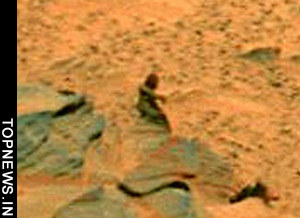A search for unusual alien life on Earth and life that can survive on Mars
 Washington, April 22 : In searching for unusual alien life on Earth, and life that can survive on Mars, scientists are experimenting with bacterial life forms to see if they can withstand extreme environments.
Washington, April 22 : In searching for unusual alien life on Earth, and life that can survive on Mars, scientists are experimenting with bacterial life forms to see if they can withstand extreme environments.
In the first research, a team of researchers from Princeton University, the Kennedy Space Center, and Michigan State University, exposed a bacterium that lives in the Siberian permafrost on Earth to the harsh conditions on Mars using a Mars Simulation Chamber.
Low temperature and atmospheric pressure, and high dryness and ultraviolet (UV) irradiation flux characterize the surface conditions of present day Mars.
Though certain terrestrial bacteria pose a serious contamination threat to Mars, the researchers found that the bacterium tested could not survive the UV levels typically found on the Martian surface.
Another research exposed an Arctic bacterial permafrost community to simulated Martian conditions, including UV irradiation equivalent to about 80 days on the surface of Mars, freeze-thaw cycles, low pressure, and comparable atmospheric gas composition.
The researchers, from the University of Aarhus (Denmark), show that the bacteria were better able to survive the deeper under the surface they were found, with a
2-centimeter layer of dust offering substantial protection.
Biomolecules, such as bacterial DNA and proteins, were more resistant to destruction than the bacteria themselves, as documented in this research.
One of the broader conclusions that can be drawn from this study is that persistent long-term forward contamination is unlikely as long as bacterial cells are deposited in the upper 2 cm of the Martian surface dust.
Astrobiologists recognize that potential life forms may be very different from the types of living organisms they are used to seeing on Earth.
In a research related to this, scientists provide strategies for addressing this challenge based on the identification of unusual life forms that may be present today or in the past in “shadow biospheres” on Earth.
The authors present a case for how the search for weird life (life as we do not know it) can begin right here on Earth.
“Alternative biochemistries may escape our current efforts tailored to characterize and identify known life,” said co-author Felisa Wolfe-Simon, Postdoctoral Research Fellow at the Department of Earth and Planetary Sciences, Harvard University.
“If identified here on Earth, a different life form may suggest either a deep root to known biology or perhaps even a ‘second genesis’ of life,” Felisa added. (ANI)